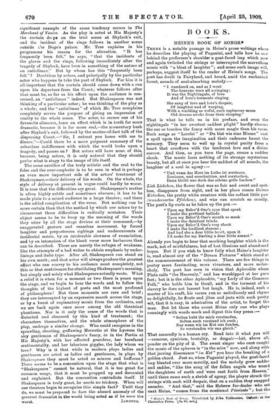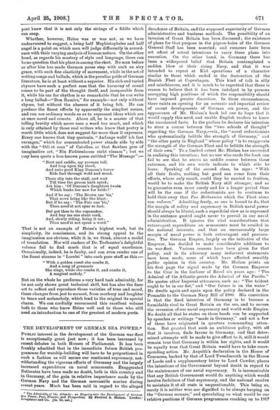BOOKS.
HEINE'S BOOK OF SONGS.* THERE is a notable passage in Heine's prose writings where he describes the playing of Paganini, and tells how he saw behind the performer's shoulder a goat-faced imp which now and again twitched the strings or interrupted the marvellous music with "a bleat of laughter"; and some such image will, perhaps, suggest itself to the reader of Heine's songs. The poet has dwelt in Fairyland, and heard, amid the enchanted forest, sounds of soul-absorbing melody:— " I wandered on, and as I went
The heavens were all a-ringing: It was the Nightingale, of love
And of love's torments singing.
She sang of love and love's despair,
Of laughter and of weeping, With a warbling so woful, such rapturous moan
Old dreams awoke from their sleeping."
That is what be tells us in his preface, and even the nightingale "in her sweetest saddest plight" hardly charms the ear or touches the fancy with more magic than his verse. Such songs as " Lorelei " or "Da hist wie eine Blume" cast a spell upon the imagination and their cadences haunt the memory. They seem to well up in crystal purity from a heart that overflows with the tenderest love and a divine sorrow. And then, as you turn the page, comes a sudden shock. The music loses nothing of its strange mysterious beauty, but all at once you hear the saddest of all sounds, the laughter of a soul in agony:—
" Und wean das Herz im Leibe 1st zerrissen,
Zerrissen, und zerschnitten, und zerstochen,
Dann bleibt uns doch das schone gels Lachen." Lielo Liebchen, the flower that was so fair and sweet and spot- less, disappears front sight, and in her place comes kleines Kiitzchen, the pretty white creature with the softest little paw (wunderzartes Pfotchen), and who can scratch so cruelly. The poet's lip curls as he takes up the pen :— "Upon my Belov'd One's eyes that speak
I make the prettiest ballads.
Upon my Belov'd One's mouth so meek I make the daintiest triads.
Upon my Belov'd One's rosy cheek I make the lordliest stanzas ; And had she a dear little heart, upon it
I'd make for my Darling a dear little sonnet."
Already you begin to hear that mocking laughter which is the mark, not of mirthfulness, but of lost illusions and abandoned hopes. But if you wish to know fully what Heine's laughter is, read almost any of the "Dream Pictures" which stand at the commencement of this volume. There are few things in poetry more fascinating, more vivacious, and more melan- choly. The poet has seen in vision that Aphrodite whom Plato calls "the Heavenly," and has worshipped at her pure feet; but it is the other Aphrodite, "my Lady of the Common Folk," who holds him in thrall, and in the torment of his slavery he does not lament but laugh. He is, indeed, such a master of his craft, his verses run so melodiously and rhyme so delightfully, he flouts and jibes and jests with such pretty wit, that it is easy, in admiratiOn of the artist, to forget the man. But let those who count Heine only one who plays cunningly with words mark and digest this tiny poem :—
" Selten habt ihr mich verstanden,
Selten aueh verstand ich ouch; Nur wean wir mm Hot tins funden, So verstanden wir uns gleich."
That assuredly is 's human cry. Read into it what you will —remorse, cynicism, brutality, or, despair—bit, above all, ponder on the pity of it. The sweet singer who once caught the music of the spheres is "in the mire" now, and along with that jarring dissonance "ins Kot" you hear the breaking of a golden chord. Just so, when-Paganini- played, the goat-faced imp bleated ever more merrily, and the melody grew sadder and sadder, "like the- scing.'of the- fallen angels who wooed the daughters of earth and 'were cast forth from Heaven," until there came such a shriek of agony; the player struck the strings with such wild despair, that On a sudden they snapped asunder. "And -that," said the Hebrew fur-dealer who sat next Heine, " coniee- fram the continual Pizzicato" ; but tha • Moines Book of Songs. Translated b ;dna T9dhunter. Oxford:"st the Clarendon Press. Vs. 6d. net.]
poet knew that it is not only the strings of a fiddle which can snap.
Whether, however, Heine was or was not, as we have endeavoured to suggest, a being half Mephistopheles and half angel is a point on which men will judge differently in accord-
ance with their varying analysis of human nature. On the other hand, as regards his mastery of style and language, there can be no question that his place is among the elect. No man before or alter him has made German prose step with such an airy grace, with such fine elasticity of movement, while in the art of writing songs and ballads, which is the peculiar pride of German literature, he is at least without a superior. His rich and varied rhymes have such a perfect ease that the harmony of sound seems to be part of the thought itself, and inseparable from it, while his ear for rhythm is so remarkable that he can write a long ballad—" Don Ramiro," for example—not only without rhyme, but without the absence of it being felt. He can produce the finest effects by apparently the simplest means, and can use ordinary words so as to represent ideas which are at once novel and remote. Above all, he is a master of that telling brevity which never uses a word too much, and which is only attained by those real writers who know that poetry is worth little which does not suggest far more than it expresses.
Every one knows that tiny quatrain, "Anfangs wont' ich fast verzagen," which for concentrated power stands side by side with the " Odi et amo " of Catullus, or that flawless gem of imaginative art, "Bin Fichtenbaum steht einsam "; but we raay here quote a less-known poem entitled "The Message":—
" Boot and saddle, my yeoman tall, And leap upon thy steed,
And unto good Ring Duncan's tower Ride fast through wold and mead.
There slip into the stall, and wait Till thee the groom hath spied; Ask him : 'Of Duncan's daughters twain Which busks her now for bride? '
And if he say: 'The Brown one 'his,'
That news bring like the blast : But if he say The Fair one 'Us,'
Thou need'st not spur so fast.
But get thee to the ropemaker,
And buy me one stout cord, And, slowly riding, bring it me ;
Thou need'st not speak a word."
That is not an example of Heine's highest work, but its simplicity, its conciseness, and its strong appeal to the imagination are obvious, while it is, we think, almost a model of translation. Nor will readers of Dr. Todhunter's delightful volume fail to find much that is of equal excellence. Occasionally, indeed, he is faulty, and can even render one of the finest stanzas in " Lorelei " into such poor stuff as this :—
"With a golden comb she combs it,
And a song of gramarie She sings, while she combs it, and combs it, A magical melody."
But on the whole he performs a very hard task admirably, for be not only shows great technical skill, but has also the finer art to reflect and reproduce those varieties of tone and mood, those changes from jest to earnest, from mockery and laughter to tears and melancholy, which lend to the original its special charm. We can cordially recommend this excellent volume both to those who know Heine well and to those who still need an introduction to one of the greatest of modern poets.























































 Previous page
Previous page